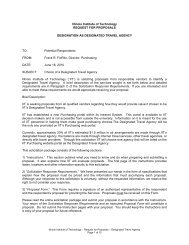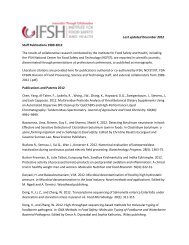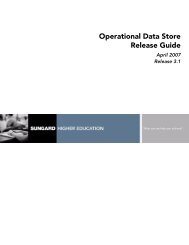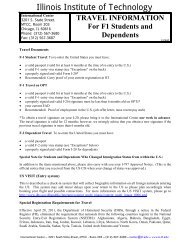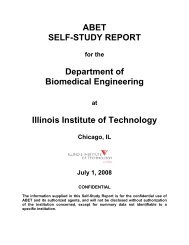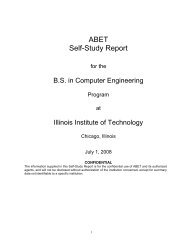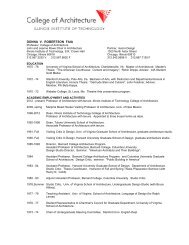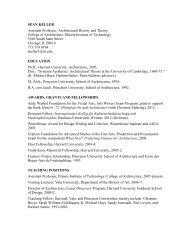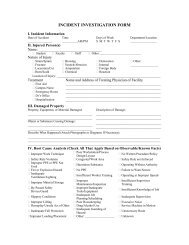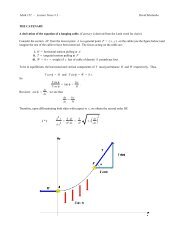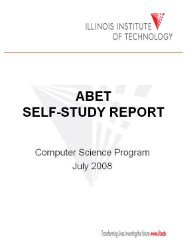Copyright & Disclaimer Information - Illinois Institute of Technology
Copyright & Disclaimer Information - Illinois Institute of Technology
Copyright & Disclaimer Information - Illinois Institute of Technology
You also want an ePaper? Increase the reach of your titles
YUMPU automatically turns print PDFs into web optimized ePapers that Google loves.
a system. (2-5-3) (C)<br />
MSED 250<br />
Curriculum/Foundations<br />
This lecture/discussion course focuses<br />
on history/sociology <strong>of</strong> education,<br />
rationales and goals <strong>of</strong> current<br />
reform efforts, curriculum design,<br />
development and curriculum analysis.<br />
(3-0-3) (C)<br />
MSED 300<br />
Instructional Methods/Strategies I<br />
Discussion/laboratory oriented course<br />
that focuses on instructional planning,<br />
implementation considerations<br />
<strong>of</strong> various teaching methods, and<br />
development <strong>of</strong> instructional activities.<br />
Students are also provided with<br />
opportunities to practice instructional<br />
skills in peer teaching lessons.<br />
Prerequisites: MSED 200, MSED<br />
250. (3-0-3) (C)<br />
MSED 320<br />
Inquiry/IPRO Seminar<br />
Seminar taken concurrently with<br />
IPRO course (preferably second<br />
IPRO) and provides students with<br />
opportunities for reflection on<br />
aspects <strong>of</strong> inquiry/problem solving,<br />
and nature <strong>of</strong> science/mathematics.<br />
Provides background for student<br />
development <strong>of</strong> instructional materials<br />
focusing on inquiry/problem solving<br />
and nature <strong>of</strong> science/mathematics.<br />
Prerequisites: MSED 200, MSED<br />
250. (1-0-1) (C)<br />
MSED 350<br />
Informal Education Practicum and Seminar<br />
Students spend approximately five<br />
hours per week in an informal education<br />
venue (e.g., museum, aquarium,<br />
zoo) along with a two-hour on-campus<br />
course per week. This course will<br />
help students develop an understanding<br />
<strong>of</strong> the roles informal institutions<br />
can play in math/science<br />
achievement and the ability to create<br />
instructional materials that capitalize<br />
on these community resources.<br />
Prerequisites: MSED 200, MSED<br />
250. (2-5-3) (C)<br />
MSED 400<br />
Instructional Methods/Strategies II<br />
Follow-up course to Instructional<br />
Methods/Strategies I with a strong<br />
focus in various advanced instruc-<br />
<strong>Copyright</strong> & <strong>Disclaimer</strong> <strong>Information</strong>: <strong>Copyright</strong> © 1994, 1995, 1996, 1997, 1998, 1999, 2000, 2001, 2002, 2003, 2004, 2005, 2006, 2007. CollegeSource®, Inc. and Career Guidance Foundation. CollegeSource® digital catalogs are derivative works owned and copyrighted by CollegeSource®, Inc. and Career Guidance Foundation. Catalog content is owned and copyrighted by the appropriate school. While CollegeSource®, Inc. and Career Guidance Foundation provides information as a service to the public, copyright is retained on all digital catalogs.<br />
<strong>Copyright</strong> & <strong>Disclaimer</strong> <strong>Information</strong>: <strong>Copyright</strong> © 1994, 1995, 1996, 1997, 1998, 1999, 2000, 2001, 2002, 2003, 2004, 2005, 2006, 2007. CollegeSource®, Inc. and Career Guidance Foundation. CollegeSource® digital catalogs are derivative works owned and copyrighted by CollegeSource®, Inc. and Career Guidance Foundation. Catalog content is owned and copyrighted by the appropriate school. While CollegeSource®, Inc. and Career Guidance Foundation provides information as a service to the public, copyright is retained on all digital catalogs.<br />
tional models such as inductive,<br />
deductive, synectics, inquiry role<br />
development, and cooperative learning.<br />
Students will have several<br />
opportunities to practice instructional<br />
models in peer teaching lessons.<br />
Prerequisites: MSED 300.<br />
Corequisites: MSED 320, MSED 350.<br />
(3-0-3) (C)<br />
MSED 450<br />
Pr<strong>of</strong>essional Internship<br />
Capstone experience in which students<br />
assume continuous teaching<br />
responsibilities in at least three<br />
classes in an area school. Students<br />
will spend a full semester in the area<br />
school under the supervision <strong>of</strong> a<br />
classroom teacher and university<br />
supervisor. Prerequisites: MSED 300,<br />
MSED 320, MSED 350. (0-40-6) (C)<br />
Naval Science<br />
NS 101<br />
Introduction to Naval Science<br />
A general introduction to seapower and<br />
the naval service. The instruction<br />
places particular emphasis on the mission,<br />
organization, regulations and<br />
broad warfare components <strong>of</strong> the<br />
Navy. Included is an overview <strong>of</strong> <strong>of</strong>ficer<br />
and enlisted rank and rating<br />
structures, procurement and recruitment,<br />
training and education, promotion<br />
and advancement, and retirement<br />
policies. The course also covers the<br />
basic tenets <strong>of</strong> naval courtesy and customs,<br />
discipline, naval leadership and<br />
ship’s nomenclature. The student is<br />
made cognizant <strong>of</strong> the major challenges<br />
facing today’s naval <strong>of</strong>ficer,<br />
especially in the areas <strong>of</strong> human<br />
resource management. Prerequisite:<br />
Consent <strong>of</strong> instructor. (2-2-2) Offered<br />
fall semester.<br />
NS 102<br />
Naval Ships Systems<br />
Designed to familiarize midshipmen<br />
with the types, structure, and purpose<br />
<strong>of</strong> naval ships. The design <strong>of</strong><br />
naval ships is examined with respect<br />
to safety <strong>of</strong> operations and ship stability<br />
characteristics. Included are<br />
nuclear and conventional propulsion<br />
systems, auxiliary power systems,<br />
interior communications, and basic<br />
damage control. Prerequisite:<br />
IIT Undergraduate Bulletin 2006–2008<br />
Course Descriptions<br />
Consent <strong>of</strong> instructor. (3-2-3) Offered<br />
fall semester.<br />
NS 201<br />
Naval Weapons Systems<br />
This course provides an introduction<br />
to the theory, principles and operation<br />
<strong>of</strong> naval weapons systems. It<br />
includes coverage <strong>of</strong> types <strong>of</strong> weapons<br />
and fire control systems, capabilities<br />
and limitations, theory <strong>of</strong> target<br />
acquisition, identification and tracking,<br />
trajectory principles, and basics<br />
<strong>of</strong> naval ordnance. This course also<br />
covers the moral and ethical responsibilities<br />
<strong>of</strong> the military leader.<br />
Prerequisite: Consent <strong>of</strong> instructor.<br />
(3-2-3) Offered fall semester.<br />
NS 202<br />
Seapower and Maritime Affairs<br />
A course based on the premise that<br />
the student must develop knowledge<br />
and interest in seapower and maritime<br />
affairs. The course is oriented<br />
toward the general concept <strong>of</strong><br />
seapower (including the merchant<br />
marine), the role <strong>of</strong> various warfare<br />
components <strong>of</strong> a navy in supporting<br />
the Navy’s mission, and the implementation<br />
<strong>of</strong> seapower as an instrument<br />
<strong>of</strong> national policy. It covers U.S.<br />
Naval history as well as the historical<br />
evolution <strong>of</strong> seapower and its<br />
effects on world history. Prerequisite:<br />
Consent <strong>of</strong> instructor. (3-2-3) (C)<br />
Offered spring semester.<br />
NS 301, 302<br />
Navigation and Naval<br />
Operations I, II<br />
A comprehensive study <strong>of</strong> the theory,<br />
principles, and procedures <strong>of</strong> ship navigation,<br />
movement and deployment.<br />
Competency is achieved in the areas <strong>of</strong><br />
piloting and celestial and electronic<br />
means <strong>of</strong> shipboard navigation.<br />
Operations topics include communications,<br />
sonar-radar search and screening<br />
theory. Tactical formations and<br />
dispositions, relative motion, maneuvering<br />
board and tactical plots are<br />
analyzed for force effectiveness and<br />
unity. Rules <strong>of</strong> the road, lights, signals<br />
and navigational aids are also covered.<br />
Prerequisite: Consent <strong>of</strong> instructor.<br />
(3-2-3); (3-2-3)<br />
201



